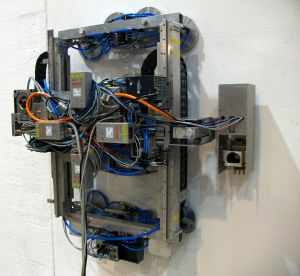About one third of the 145 nuclear power plants presently in operation in Europe will reach the end of their scheduled service life in 2025. Safe decommissioning and safe waste disposal represent big challenges for industry, science, and society. Hence, it is important to develop competencies for the decommissioning of nuclear facilities in Germany and Europe and to qualify and train workers for this activity. For this purpose, five leading institutes have established the cluster for Decommissioning of Nuclear Facilities.
“After the shutdown of the nuclear power plants, work will start. Thanks to this cluster, decision-makers in industry, politics, and the public will now easily find scientific contact partners for this task”, Professor Oliver Kraft, KIT Vice President for Research, says. “Moreover, it is here where we will train the engineers needed for the many years of safe decommissioning work.”
“In Baden-Württemberg, it is not only industry, but the universities that possess and develop the know-how required for the safe decommissioning of nuclear facilities. The cluster will bundle existing expertise, add additional competencies needed, and make all these findings available for on-site decommissioning,” Head of Department of the Baden-Württemberg Ministry of Science, Research, and the Arts, Simone Schwanitz, says during the kick-off meeting.
“Complete decommissioning of nuclear facilities is a rather complex problem with countless framework conditions and variables for all operators and authorities,” explains Dr. Thomas Walter Tromm, KIT, spokesman of the Nuclear Waste Management, Safety, and Radiation Research Helmholtz Programme. “Decommissioning of nuclear facilities covers a large number of aspects, the leading experts of which are now involved in this cluster.”
The Decommissioning of Nuclear Facilities cluster will develop decommissioning strategies in accordance with the legal framework conditions and on a scientific basis. This will also include optimization of decommissioning management and of the decommissioning technologies to be applied. Decontamination and conditioning technologies as well as measures to protect the personnel, population, and nature against radiological exposure are further developed. Not least, appropriate participation and information of the public shall be considered in decommissioning management.
The partners of the cluster plan to coordinate and bundle their activities in research, education, and training, to intensify cooperation with authorities, industry, and science, to support the maintenance of competence, accompany professional developments, and participate in international bodies relating to decommissioning standards. Joint representation to external partners, including industry and students, at trade shows, and in expert journals is envisaged.
Founding members of the cluster are Karlsruhe Institute of Technology, Karlsruhe Cooperative State University, University Stuttgart with its Institute of Nuclear Technology and Energy Systems and its Materials Testing Institute, the Paul Scherrer Institute in Switzerland as well as the Institute for Transuranium Elements (Karlsruhe) and the Institute for Reference Materials and Measurements (Belgium) of the Joint Research Center of the European Commission.
More Information on Some Partners of the Cluster:
Since 2008 already, KIT researchers have been conducting research and providing education on the decommissioning of nuclear facilities. They develop technologies for decontamination and release measurement of surfaces. Methods to cut massive reinforced concrete components are studied for application in nuclear facilities. In the area of optimization of management, the focus lies on internal procedures, such as the planning of licensing and the optimization of project management. Some innovative new developments in the area of methods and techniques have already resulted in successful practical applications.
The Karlsruhe Cooperative State University (DHBW) offers the bachelor’s program “Sicherheitswesen” (safety engineering) that covers the areas of radiation protection, industrial safety, and environmental engineering. This scientific-technical program aims at imparting the qualification of a radiation protection or safety engineer. Apart from additional qualifications, such as radiation protection commissioner or industrial safety expert, an in-depth program “Decommissioning and Disposal” with integrated practical work phases at partner institutions active in the area of decommissioning of nuclear facilities is offered.
The researchers of the Joint Research Centre – Institute for Transuranium Elements (JRC-ITU) of the European Commission develop and operate a large range of latest scientific measurement methods and devices for the protection of European citizens against the hazards associated with the handling and storage of high-level materials.
Details on the Chair for Decommissioning at KIT: http://www.tmb.kit.edu/english/941.php
More about the KIT Energy Center: http://www.energy.kit.edu
Being “The University in the Helmholtz Association”, KIT creates and imparts knowledge for the society and the environment. It is the objective to make significant contributions to the global challenges in the fields of energy, mobility, and information. For this, about 10,000 employees cooperate in a broad range of disciplines in natural sciences, engineering sciences, economics, and the humanities and social sciences. KIT prepares its 22,800 students for responsible tasks in society, industry, and science by offering research-based study programs. Innovation efforts at KIT build a bridge between important scientific findings and their application for the benefit of society, economic prosperity, and the preservation of our natural basis of life. KIT is one of the German universities of excellence.

